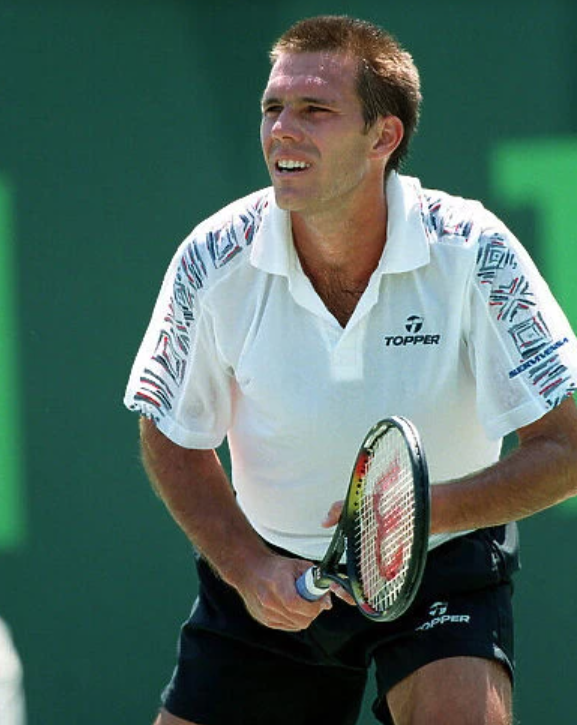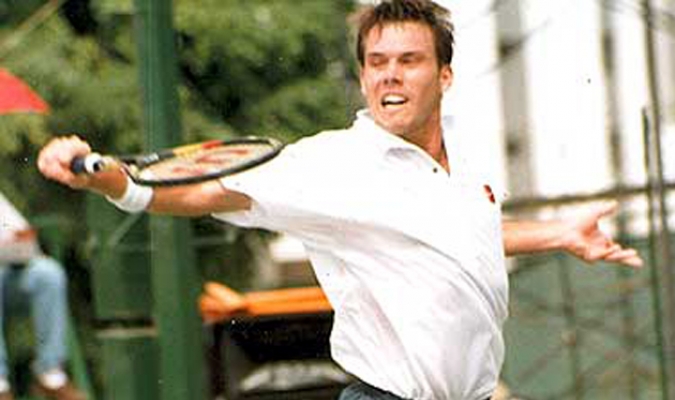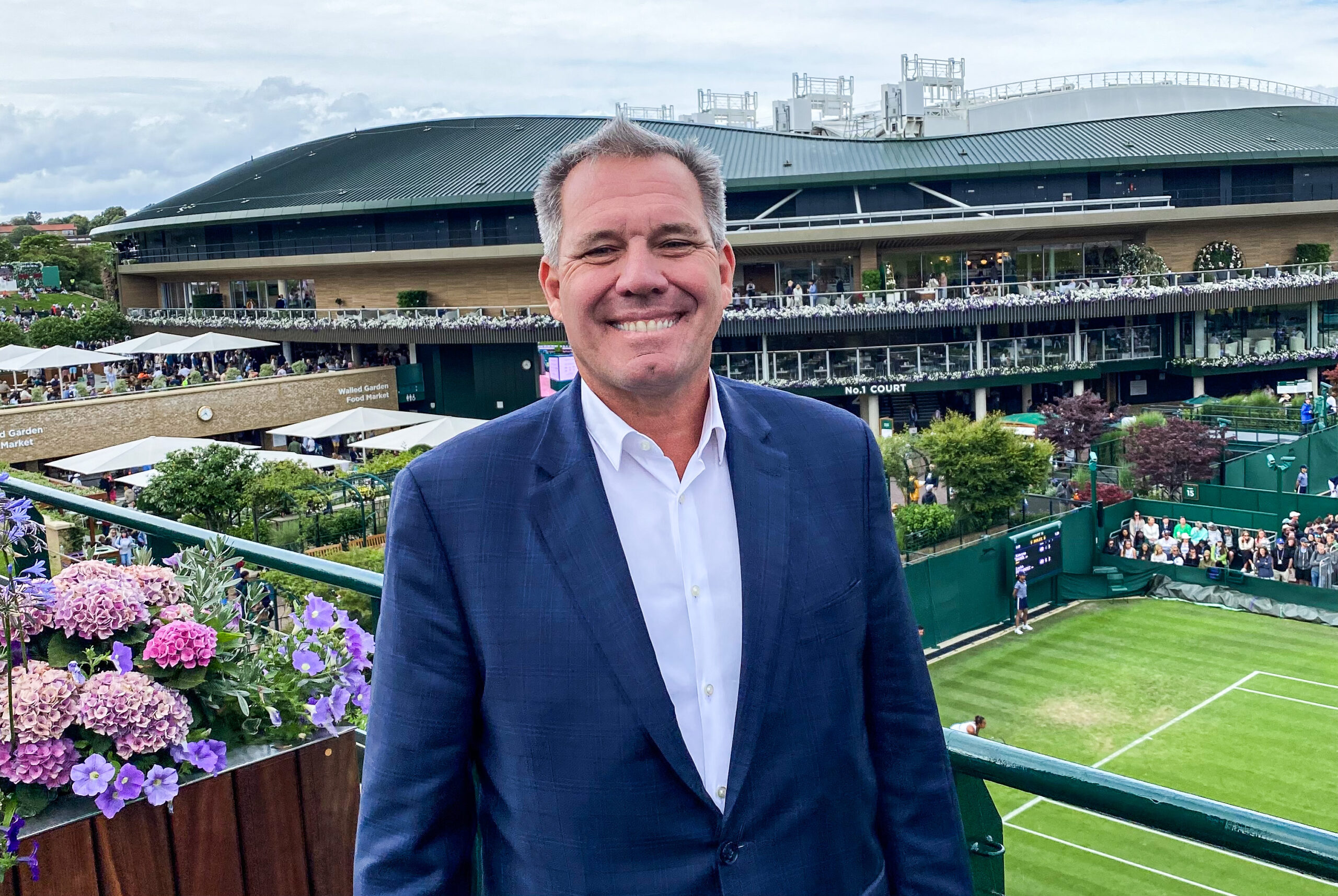LONDON – The passion for tennis does not let go of Nicolás Pereira. Pro player in the nineties, TV commentator since the beginning of the 2000s, and also from 2023, member of the ATP Players’ Council. The Venezuelan is the representative of former professional tennis players.
“Djokovic will always be the villain of the movie, because with two superheroes like Federer and Nadal there is simply no room for a third, and even less if he comes from behind to surpass all their records. I think he would have made a lot more money if he had taken off his mask and been the villain in the movie. But I think he wants to be adored and I think he deserves it”, he tells CLAY sitting on the media terrace at Wimbledon, overlooking the courts where he first played at age of 14.
Pereira loves to talk about tennis and anything about it. He doesn’t dodge questions in an in-depth interview that covers politics, the Big Three, Alcaraz, Del Potro and sexual minorities in the sport.
– What did you think of the men’s final at Wimbledon?
It exceeded all expectations. It was one of the best matches I’ve seen in recent years. A star was born in front of our eyes. Carlitos Alcaraz won the US Open, yes, but it is not the same in Wimbledon Centre Court against the seven-time champion and the best player at the moment, Novak Djokovic. You have to stop and analyze the tiebreak of the second set, also that 27-minute game, which is the best we have seen on that stage. The way Alcaraz held that break, and the way he closed the match is incredible.
– Does Alcaraz surprise you? Do you think he can reach historic numbers in the future?
– If at 20 years old Alcaraz showed that mettle and that audacity in such delicate moments, then there is hope for a bright future. He has played only 10 Grand Slam tournaments and have won two. Think about it, neither Federer, nor Nadal, nor Djokovic were at his level at this point in their career. Alcaraz has the talent and temperament to go for those Big Three numbers that seem unattainable. It remains to be seen how he deals with injuries. He has it all.
– That comparison of Alcaraz and the Big Three? Does it make sense to you?
– I agree with Djokovic, that Alcaraz combines many qualities of the Big Three. He saw them play since he was born, imagine what a good influence for a player. And I don’t think he will be the only one, I think more will come with the inspirational legacy of the Big Three. We must mention Juan Carlos Ferrero, a great job he has done. Many do not know that was the agent Albert Molina who 7-8 years ago took Alcaraz to him to start the project. It is incredible what we see, an impressive story.
– Why do people react to Djokovic from such opposite poles? There’s praise, there’s booing… And he’s the most successful male player in history!
– Djokovic will always be the villain of the movie, because with two superheroes like Federer and Nadal there is simply no room for a third, and even less if he comes from behind to surpass them in number of Grand Slams and numbers of all kinds. The crowd in London is as rigid and puritanical as it gets. Certainly the breaking of the racket against the net post does not coexist much with the idea of tennis on that court, but Djokovic is what he is. He is a warrior, a great soldier. If he were to take on the role of the villain, I think he would win a lot more. He wants to be liked and loved. A lot of people are on his side, he certainly has a lot of followers and lovers. I think in time, they’re going to give him his due. He’s like an Ivan Lendl, if you can compare him, another legend who dominated an era. You have to enjoy him with the good, the bad and the ugly. He always gives his all.

– What memories come to mind when you breathe the green of Wimbledon?
– In 1985 I was playing junior tournaments in Europe and I received the notification that I had entered Wimbledon. At that time it was not by ranking, but the federation would put you in. I don’t know what maneuver they used, but I was able to come and play when I was 14 years old. I arrived at the airport, took the train to Southfields and had to walk the kilometer uphill from the station to the All England Club with a 30 kilos suitcase without wheels. It was unforgettable to see this majestic place for the first time. And every time I come back I find improvements. The place keeps changing, but they always keep the tradition that makes it so magical.
– You were the junior champion in 1988…
– I had won the Grade A in Caracas, which is the same week as Australia. It was a very high level championship. Then I won Roland Garros. And although grass was my best surface, I didn’t have high expectations at Wimbledon. I keep that memory with great affection and honor. I remember that in the semis I lost the first set and then I said “If there is any tournament I can’t miss winning, it’s this one”. It was nice. I finished on a Monday because of the rain and we had to play on another court, not on Court 1, but the trophy is the same.
– What is the most important factor to define a player as the GOAT?
– It’s not all said yet. I see three to five clear chances for Djokovic to win more Grand Slams. We have to see how Rafa comes back. I see it on an individual basis and the numbers don’t lie with Djokovic. For me Federer means the massification of tennis, what everyone idealizes in a tennis player; the professionalism and respect towards the rivals and the game in Nadal is exceptional; and what Djokovic did in an era with two giants, managing to surpass their records is something that would never have been thought. With a generaI view I see it as a privilege for all of us. I don’t see the need to pick one, but let people talk. The more people talk about tennis, the better.
– According to Juan Monaco, Djokovic will never be able to get the fan love that Nadal and Federer have. Do you agree?
– I agree with Pico. Although I think if Rafa decides not to play anymore, Roger already out, no doubt Djokovic will get the affection he has always been looking for. And I would like to see him receive it, because you can see that he is a person who wants to be loved. I think he would have made a lot more money if he had taken off his mask and been the villain in the movie. But I think he wants to be adored and I think he deserves it.
– How awesome is tennis… One of the most mentally toughest athletes in history has been rattled, as in New York in 2021, on the verge of completing the Grand Slam. Alcaraz cramped up in Paris, then learned from the mistake at Wimbledon.
– Novak could not play that match from nerves. Tennis wise he was going through a better time than he is now. But mentally he has proved to be a giant. And Alcaraz with all the confidence he has happened to him at Roland Garros. The 48 hours before the match against Djokovic weighed him down. And if it happened to Djokovic in New York, it also happened to Serena Williams against Naomi Osaka when she was playing to tie Margaret Court. You can see that it can happen to anyone. Tennis is very complex.
– What is the best version of a tennis player in history?
– By far Nadal in Paris’ central stadium. That’s the most difficult tennis match of all time. There is no room for doubt.
– How do you see tennis in the Latin American region?
– I was delighted to see Nico Jarry surpass his previous level, let’s hope Cristian Garin can do the same. Seba Baez is playing very well. There is concern for El Peque, I would like to see him continue with success. Juan Pablo Varillas’ performance in Paris was magnificent. I don’t see a superstar. I am surprised that someone of Guga’s stature did not come out of Brazil, in such a big country that was fascinated by his charisma and personality. Yes there was Thomaz Bellucci and Thiago (Seyboth Wild) playing quite well, but neither in Brazil nor in the rest of the region there is no superstar in sight, there doesn’t seem to be a Delpo on the horizon.
– Speaking of Juan Martin Del Potro…. should he show up in New York as he said he wanted to do to say goodbye to tennis?
– I wish him the best. I love him very much. I was there in 2009 following that title, that celebration. He had very bad luck with injuries. I don’t know how he is now, but from what I’ve heard I don’t see him healthy enough to play in a tournament of that category.
– But if he wants to, he picks up the phone to call the organization and they are already giving him the wild card, right?
– We have to see if they give it to him, because if you are not 100% they prefer to give it to someone who can take advantage of it.
– Is it a risk for his image to take a beating at Arthur Ashe?
– It’s possible.
– How was the issue of sexual diversity dealt with in your time in tennis?
– I think the tennis player in general was a pretty liberal person, at least in my time. 20-25 years ago being a professional tennis player meant that you had a pretty free view of the world. Today the tennis player is much more conservative as a person. Times have changed. Regarding people’s view on sexuality, it has changed a lot in the last few years. They have become much more educated, it is practically an obligation to accept all diversities. I think the same way: I respect everyone and I am not uncomfortable with any option, I don’t think it’s better or worse. I believe in respect for everyone.
– What would it have been like if a male tennis player came out as gay in the 90s?
– In my time there were a couple of players who maybe didn’t want to come out at that time, who did it after they finished their career. It’s very likely that they exist today (gays on the men’s circuit). In women it’s much more open. No one has come out and I don’t think it will be big news when that happens.
– Is tennis not a safe place for sexual minorities?
– Or maybe the person wants to keep their privacy. As a matter of privacy. Maybe it’s something that suits him financially, to come out, because I think there would be a lot of sponsorship opportunities for someone who come out as gay. Thinking about it a little bit, on the men’s top part of the tour I don’t see any at the moment.

– Key Biscayne is now your residence. Do you think it was a crime to take the Miami Open out of there and move it to an area with less history and atmosphere?
– It was just too small. The place was revolutionary in its time. The community enjoyed it very much, but there was simply not enough space. Players were limited in the number of guests, traffic was a problem. It was a business decision by the new owners. IMG saw an opportunity to partner with a very powerful person and make a business. Financially it worked out well.
– How do you see the relationship between the media and the players? As you have been on both sides, don’t you think they have distanced themselves from each other? Aren’t they too unapproachable?
– What happens is that there is a lot of media and the tennis player has limited time. It seems to me that there is too much access. The big tennis players after the matches have an hour and a half to two hours with the media and I think it’s too much. Everything has changed over time. I think tennis players are less wasteful to open up. They put the cassette a lot, and they say the right thing they have to say. There aren’t many tennis players that you go to interview and say ‘wow, what a good opportunity I’m going to have with this guy to talk openly’. There are some who are very good, who communicate, who are open and truly listen and reason the question. But most don’t. Most don’t often say what they feel.
– Who are some examples?
– I’ll mentions some of the ones who do care. Nadal and Azarenka, for example. You know they will answer you fully. They respect the journalist’s work. There are others who don’t, who simply feel that they are doing the journalist a favor by talking to them, when in fact it is not the journalist they are talking to. They are talking to their audience. The journalist drives the message to the audience. There are a lot of tennis players who don’t get that.
– I have to ask you about the situation in your beloved Venezuela.
– Venezuela for me is the greatest tragedy of my life. After the death of my father last year, it is the most painful thing I have had in my life. I wanted to live in Venezuela, which is undoubtedly the best country in the world. A country that welcomed us as immigrants from Uruguay when I was three years old. A country with people with a huge heart, a beautiful place, kind, privileged country, and the great pain is how they let foreign powers take over Venezuela. The Cubans, the Russians and the Chinese. And now also the Arabs are the owners of Venezuela. Not the Venezuelans. It is a great sadness that my children cannot have the childhood I had.
– Don’t you think the country can take a different course?
– No, they have already destroyed the essence. They created hatred between social classes, which did not exist before. We all lived happily, Indians, blacks, whites, foreigners, Venezuelans. Now there is a lot of corruption, bad management, little education. I believe that the few who are in power now are not interested in changing anything.
– Can it get worse?
-Yes, always.
– And do you have at least a glimmer of hope?
-There is always hope, but I am not going to live to see Venezuela become a prosperous country. I think it will eventually happen. I hope the next ones will do better. We have proven to be bad citizens in Venezuela.
– On the subject of tennis, Caracas has always had a nice tradition of clubs from different colonies.
-Yes, there still is. The clubs are very good in Venezuela because they are sanctuaries, especially in the peaks of violence. There is no money anymore, so even the thieves left Venezuela, but at a time when it was very violent, they have served as a bubble of security and tranquility in a chaotic city.







